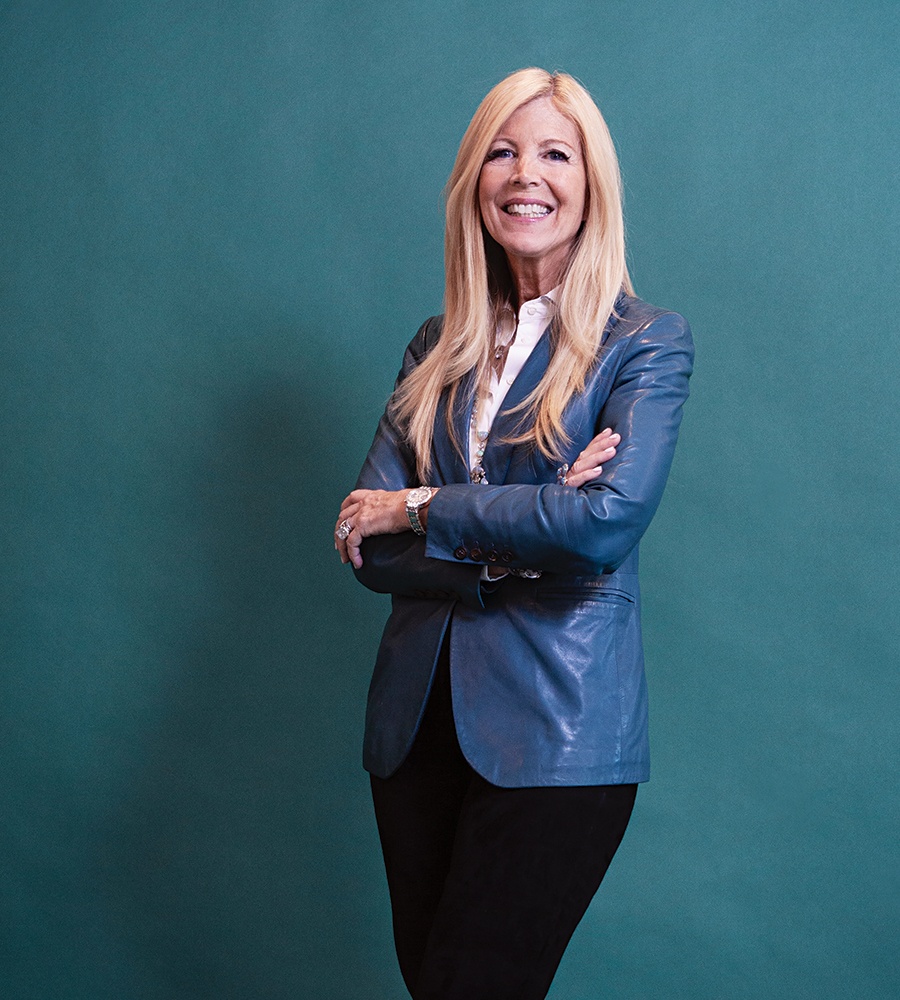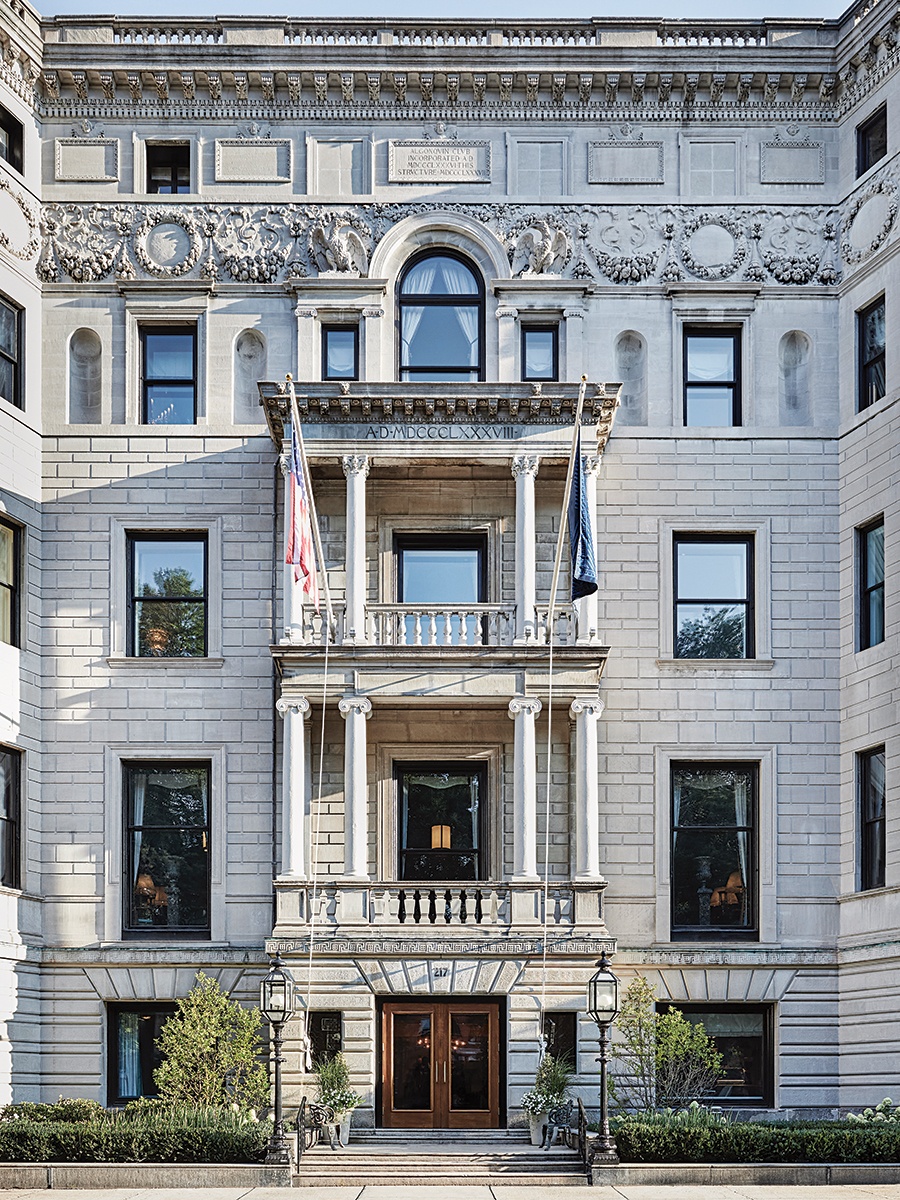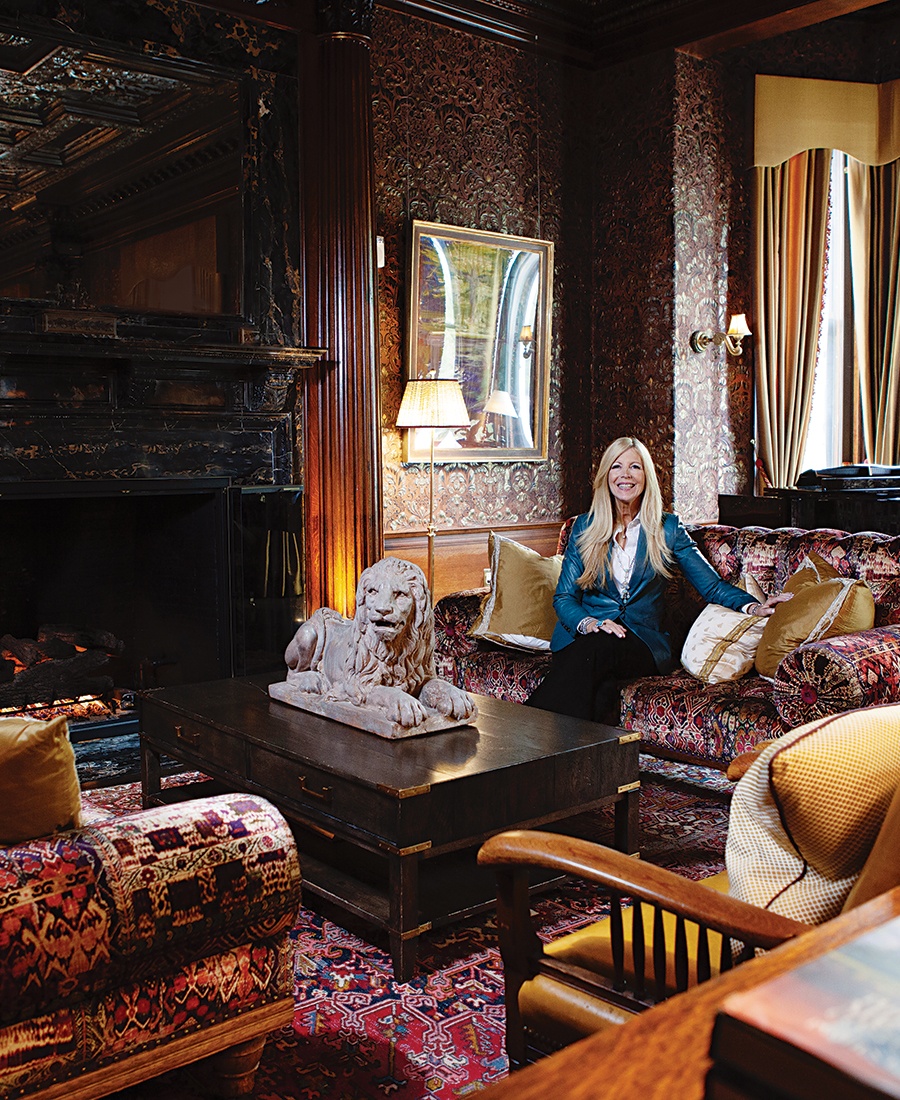The Interview: The ‘Quin House Cofounder Sandy Edgerley
The philanthropist, Harvard graduate, and longtime Bostonian—who's turned the quiet old world of private clubs on its head—talks real estate, high-end style, and Julian Schnabel.

Photo by Mona Miri
Sandy Edgerley used to spend a lot of time at Clarendon Street Playground in the Back Bay, making connections with other moms as she watched her young children play. Today, the No. 12 Most Influential Bostonian of 2023 is still making connections, albeit in a much grander way: as the cofounder of the ’Quin House, a 21st-century private social club that instantly became the most coveted membership around when it opened in 2021. A Harvard graduate and MBA who’s known for her enviable style and eye for art—the ’Quin’s permanent collection has more than 400 pieces, including a Picasso and a Warhol—Edgerley is deeply involved with numerous nonprofits, including the Boston Foundation. We sat down with her this spring to talk real estate, secret rooms, and why Friends will always be one of her favorite sitcoms.
What was your vision for the ’Quin?
My husband, Paul, and I have been in Boston for a long time, and I feel like we’ve met so many people in different ways, whether through work, our kids’ schools, nonprofit involvement, or just the neighborhood. But we could never figure out how to socialize with them or where we could run into these people. Where do you gather together? And in an easy kind of way? When our kids were little, we lived in the Back Bay, and I’d take them to the Clarendon Street Playground. You didn’t really have to make a plan. It was social activity without having to work too hard, and I hope the ’Quin is like that.
The club has so many little secrets and special touches, like the champagne button in Scottie’s and the bust of Sinatra that opens a secret door to the listening room. How many times have you pressed the champagne button or the Sinatra bust?
With the champagne button, I actually don’t drink alcohol, so I’d be more prone to press for a Diet Coke. I’ve used the Sinatra head many times, though. When we were going through the design process, I really wanted to have these little moments of surprise, where you kind of have to be an insider to know, and it’s unexpected. I loved the idea of a secret room, a hideaway where you can listen to records. And my husband Paul’s birthday is the same day as Frank Sinatra’s, December 12, so I thought it would be cool.
Any changes afoot or plans for expansion?
The club is 56,000 square feet, believe it or not, so we did our very best to get it right the first time. But as we’re starting to realize how our members use it and what we could have done differently, there are going to be some tweaks. For example, we have two rooms that are like function or conference rooms. When we originally designed them, it was pre-pandemic, and we thought members would have meetings here or bring their work teams here for brainstorming sessions. And now, of course, people aren’t really looking for those kinds of spaces anymore. So we’re going to convert it into private event space.
Any plans for new hospitality ventures?
I want to make sure we’ve reached our full potential with the ’Quin, and we’re well on our way to doing that. At some point, when we’re really operating on all cylinders, if there’s a demand, could we potentially expand? I don’t know yet. I think I’d be open to it. People from other cities and some of our non-resident members have said, “Please, would you do this in Chicago or wherever?” And right now, I say no. But never say never.

The ‘Quin House’s Commonwealth Ave exterior. / Photo by Jenna Peffley
Is real estate the easiest way to get rich?
I’d say it’s an effective way for a person to become self-sustaining and invest for a great life in the future. When Paul and I were engaged, we were having dinner with my parents, who were both European and had lived through the war. My father was from Belgrade, in a country that was taken over by Communists, and my mother is from Vienna, and they said they had some important advice for us. I remember thinking, “This is going to be about togetherness or love.” Instead, they said, “Invest in real estate.” [Laughs.]
You also run Hexagon Properties, which specializes in luxury rentals. When it comes to your primary residence—rent or buy?
I think if you can, own, but a lot of it depends on how much you want or need to be in one place versus being flexible. I have four kids. They’re all in their twenties, and they’re all renters because they’re young and starting out in their careers, still figuring out where they’re going to be. You have to take a little bit of a long-term view to buy.
So many of Boston’s wealthiest families seem to be in real estate.
Well, when you look at lists of the super wealthy, I don’t think a lot of those fortunes are from real estate. It seems like technology and invention, creativity and innovation, are probably more common sources. But real estate is an asset that hopefully will grow in value, and ideally, and more important, it’s also something that brings you joy. It’s more about family, and home and hearth, and all those things so that you have the psychic value of that.
You’re known for your style. Is Boston a fashionable city?
I think it’s more fashionable than its reputation. I have so many friends who are so stylish. They always look incredible. We have a reputation for being stodgy and not very chic, but the reality is different than that, and it’s just getting more so. I think people, in general, like to dress up and put on something cool. At the ’Quin, we don’t have a dress code. It’s come as you are because if you’re, let’s say, a tech entrepreneur in your twenties, you’re probably working in something super-casual. I never wanted that to be a barrier or to feel like you had to put on a jacket and tie. But people do make an effort.

Photo by Mona Miri
Where do you get your style?
My mother was an artist, so I think I’ve always had an artistic appreciation. Maybe it comes from the fact that I’m an art lover? I’m certainly not an art producer. I can’t draw well or anything like that. But I like to express myself through what I wear, and I do feel like that’s a creative statement.
Do you have a muse?
I take inspiration from a lot of different people. I have a daughter—three sons and one daughter—and she’s always an inspiration. I have friends who I admire, people I look up to. But in terms of fashion sense? I probably take a little bit from a lot of different places.
Favorite shopping city?
I’ve been enjoying London. And I’ve gone to some fashion shows in Paris, which is so much fun. But honestly? I love shopping in Boston.
Where do you shop in Boston?
I love Saks. I’m a longtime Neiman Marcus customer. I’ve done Alan Bilzerian for edgier things. They always pushed me to try new things, which I love. And there are so many beautiful stores on Newbury Street. I have fun poking into all of these different places and seeing what they have.
Favorite foreign city to visit and favorite hotel?
One of my favorite cities is Vienna because my mom was from there, and when I was growing up, I used to visit my grandparents there, so when I go back, it always feels a little bit like home. I’ve had the opportunity to stay at the Sacher hotel, right in the center of the city. It’s just this Old World, beautiful hotel.
What is the significance of your company’s name, Hexagon?
Ultimately, it comes from our last name. We had a small boat, like a little dinghy, and we were going to name it. The kids were fairly young. And we wanted something kind of family-oriented. So we thought, “Edgerley. Edge.” And then one of our kids said, “Six edges,” because there are six of us. And it turns out that the hexagon, I believe, is the strongest shape in nature, so we thought that was very cool. It became like a family symbol.
What three things are always either on your person or in your purse?
My wallet and my cell phone, for sure. My daughter was just saying, “I think you’re addicted to your phone,” and I was like, “No, I’m not. I can put it down.” But I’m not actually sure that’s the case. And I always have my favorite lip balm by RéVive. It’s just so good. I also take my iPad everywhere.
You’ve assembled a world-class art collection. What’s the first thing you look for in a piece?
Just how I feel about it. It’s a visceral thing. Do I love it? Does it make me pause for a moment? That’s really it.
Favorite artist?
We just had Julian Schnabel here yesterday. He’s one of my favorite artists, and we’ve now developed a friendship over the years because we’ve gotten to know him, and that adds a whole other layer to it.
What’s the one thing you’d grab if the house was burning?
Well, first, of course, my family. I’d make sure everybody was safe. And then maybe my wedding album. That was such a special day. We’ve been married for 33 years.
You went to Harvard Business School. Is it worthy of the hype, or is it just a label?
It’s worthy of the hype. I had the most incredible experience there. As an undergraduate, I was a biology major, and then I worked at Bain & Company for three years. But when I went to Harvard Business School, I felt like I was actually learning business because they teach by the case method. You learn quickly how to get to the essence of a strategic problem because you’re doing three cases a day. You’re reading it. You’re doing the analysis. You’re getting to the crux of it. So over a two-year period, I think you get quite good at solving strategic problems. It teaches you a new way to think.
You’re one of the city’s most generous philanthropists but also one of its quietest. Is that intentional?
We’ve been very lucky that we can give back, and my husband and I are big believers in trying to make a difference. I’ve been very involved in nonprofits my whole career. I did consulting from the beginning, and then there were about 15 years when I wasn’t working, and I was on nonprofit boards and very, very involved as a volunteer. To me, that’s important because I want to understand what’s happening. How can we make a difference? And how do we support the amazing staff and leaders of these organizations? I mean, the Boys and Girls Clubs of Boston is changing lives. So is Big Brothers Big Sisters and the mentorship that’s happening at Horizons for Homeless Children. The Boston Foundation, United Way—we’re so lucky to have these incredible organizations with a huge amount of innovation.
Is Boston a leader in that way?
Absolutely. There are so many great, innovative ideas and solutions that develop here and then go national. I love that. It’s like the spirit of innovation lives in the nonprofit sector as much as it does in the tech or life sciences, or other sectors in Boston. It’s also where I’ve made so many of my best friends from what we’ve done together. I feel so lucky to be a part of the nonprofit community.
What’s the first thing you notice about a person when you meet them?
I always look for kindness, openness, and warmth.
If your life were a TV show, what would it be?
Ooh, that’s a good question. I can tell you the shows I love, like Friends or How I Met Your Mother. It’s always a group that has these long-term relationships. So I guess it would be an ensemble comedy.
Flower you’re most drawn to?
I love orchids.
Is there a business you’re curious about that you’d want to be involved in?
Well, the ’Quin House and hospitality were it for me. That was kind of the dream that I wanted to try. I don’t know what would be interesting to do next. I’d have to give that some thought. Maybe there’s a next chapter for me.
By the Numbers
Gone Clubbing
The ’Quin is the place to be—here’s a peek at what goes on inside.
1,600
Number of martinis poured every month at the club.
400+
Number of artworks in the ’Quin’s permanent collection, which includes pieces by Picasso and Andy Warhol.
2,800+
Number of vinyl albums in the ’Quin’s record collection.
1,650,000
Amount, in dollars, the ’Quin’s philanthropic arm, the ’Quin Impact Fund, has given so far to more than 47 organizations.
2,300
Number of burgers sold each month at the club’s restaurants.
First published in the print edition of the June 2023 issue with the headline “Simply Sandy.”
Previously
- The Interview: Crime-Fiction Writer Dennis Lehane
- The Interview: Novelist Hank Phillippi Ryan
- The Interview: Black Economic Council of Massachusetts Head Nicole Obi
- The Interview: GBH President and CEO Susan Goldberg
- The Interview: MIT President Sally Kornbluth
- The Interview: Boston Public Library President David Leonard
- The Interview: CNN Anchor and Correspondent Audie Cornish
- The Interview: Joey McIntyre of New Kids on the Block

